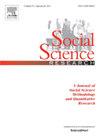Adaptive educational expectations: How do parental educational expectations respond to child academic performance in various family contexts?
IF 3.2
2区 社会学
Q1 SOCIOLOGY
引用次数: 0
Abstract
Parental educational expectations are well-studied in sociology of education and social stratification and mobility, but most literature conceptualizes these expectations as static or considers how they change only at key educational junctures such as educational transitions. Whether parental educational expectations adapt to child academic performance more generally, and what might be the key theoretical components in adaptation, are not well-conceptualized or tested. To address these limitations, we posit and test the concept of adaptive educational expectations. Our concept encompasses three key propositions: adaptability – parental expectations adapt to child academic performance; relative responsiveness – the adaptive response of parental expectations to child performance is larger in magnitude than the responsiveness of child performance to parental expectations; and heterogeneity – the adaptability of parental expectations varies across family contexts. We test the concept using the case of China, the largest education system in the world, with analyses of longitudinal data from the China Education Panel Survey. Findings show that parental expectations are more adaptive to child performance in low-SES families than in high-SES families and in rural areas than in nonrural areas, but there is no difference in adaptability by child gender and sibship size. These findings indicate that the adaptation of educational expectations is more shaped by socioeconomic circumstances than family demographics. Furthermore, the use of this concept reveals a hidden form of educational inequality that prior literature often neglects: compared with high-SES parents, low-SES parents not only hold lower educational expectations but are more likely to decrease their expectations when child academic performance declines, which further reduces their educational involvement. These findings illustrate the relevance of all three features of the adaptive educational expectations concept.
适应性教育期望:在不同的家庭环境中,父母的教育期望如何影响子女的学习成绩?
父母的教育期望在教育社会学和社会分层与流动性中得到了充分的研究,但大多数文献将这些期望概念化为静态的,或者只考虑它们在教育过渡等关键教育时刻如何变化。至于父母的教育期望是否会适应子女更普遍的学业成绩,以及适应过程中的关键理论要素是什么,都没有得到很好的概念化或检验。为了解决这些局限性,我们提出并检验了适应性教育期望的概念。我们的概念包含三个关键命题:适应性--父母的期望能适应子女的学业成绩;相对反应性--父母期望对子女学业成绩的适应性反应在程度上大于子女学业成绩对父母期望的反应;异质性--父母期望的适应性因家庭环境而异。我们以中国这个世界上最大的教育体系为例,通过对中国教育面板调查的纵向数据进行分析,检验了这一概念。研究结果表明,与高社会经济地位家庭相比,在低社会经济地位家庭中,以及在农村地区与非农村地区相比,父母的期望对子女表现的适应性更强。这些研究结果表明,教育期望的适应性更多地受到社会经济环境的影响,而不是家庭人口统计的影响。此外,这一概念的使用揭示了以往文献经常忽略的一种隐性教育不平等形式:与高社会经济地位的父母相比,低社会经济地位的父母不仅持有较低的教育期望,而且在孩子学习成绩下降时更有可能降低期望值,从而进一步降低他们的教育参与度。这些发现说明了适应性教育期望概念的所有三个特征的相关性。
本文章由计算机程序翻译,如有差异,请以英文原文为准。
求助全文
约1分钟内获得全文
求助全文
来源期刊

Social Science Research
SOCIOLOGY-
CiteScore
4.30
自引率
4.00%
发文量
0
审稿时长
65 days
期刊介绍:
Social Science Research publishes papers devoted to quantitative social science research and methodology. The journal features articles that illustrate the use of quantitative methods in the empirical solution of substantive problems, and emphasizes those concerned with issues or methods that cut across traditional disciplinary lines. Special attention is given to methods that have been used by only one particular social science discipline, but that may have application to a broader range of areas.
 求助内容:
求助内容: 应助结果提醒方式:
应助结果提醒方式:


